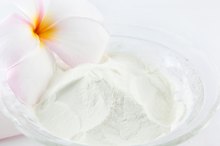The Best Vitamins for Autoimmune Problems
An autoimmune condition results when your immune system attacks your own body. Antibodies are formed against a particular type of tissue much as though it were a bacteria or virus. This causes your system to launch an inflammatory response. There is no simple, single cause for autoimmune disorders. Sometimes an illness or a severe stress situation seems to trigger the immune system to malfunction. There are genetic factors that may make you more prone to these disorders, but are not the direct cause. The immune system has a regulatory method that is intended to prevent attack against harmless invaders or your own tissue. Vitamins that support the immune system itself may also help to restore the regulation of the immune system. They are not a cure for autoimmune disorders.
Vitamin D
Vitamin D is directly involved with the immune system. Your body converts some of this vitamin into an active hormone called calcitriol. As reported in "BMC Genomics," calcitriol switches on an antibacterial protein as a first-line defense against all unrecognized invaders. It is also important in preventing an overreaction to harmless visitors or your body’s own cells. If you have an autoimmune disorder, you can ask your physician to test your 25-hydroxyvitamin D level. If you are deficient, your immune system may not be functioning optimally.
Vitamin A
Does Vitamin B-12 Cause OCD to Be Worse?
Learn More
The textbook "Preventive Nutrition: The Comprehensive Guide for Health Professionals" refers to vitamin A as the anti-infective vitamin because it is required for normal functioning of the immune system. It accomplishes this by maintaining the mucosal cells that act as a barrier to invading germs, and by its involvement in the production of lymphocytes and the T-lymphocytes vital to the immune system. Vitamin A is essential, but large amounts are not required. Your body can use vitamin A from animal sources, or convert the vitamin from plant sources. Vitamin A is also required for your body to use vitamin D.
Vitamin B6
The vitamin B6 group also has functions in your immune system. According to Dr. Jane Higdon of the Linus Pauling Institute, “Decreased production of immune system cells known as lymphocytes, as well as decreased production of an important immune system protein called interleukin-2, have been reported in vitamin B6 deficient individuals.” Balance is important with all the B complex vitamins as many of them are interdependent. You need only 1.3 mg of B6 a day as an adult. You can’t make this vitamin, so a healthy diet or supplements are required to obtain it.
Other Vitamins and Nutrients
Mushrooms That Are Antiviral
Learn More
In an article by Virginia Drake, Ph.D., several other nutrients are discussed as vital to the proper functioning of the immune system. The vitamins are C, E, B12 and folate.The trace minerals are zinc, selenium, iron and copper. Only small amounts of these trace elements are needed.
Related Articles
References
- “The Merck Manual” Seventeenth Edition; Editors Beers, MD and Berkow, MD;1999
- BMC Genomics: Exaptation of an ancient Alu short interspersed element provides a highly conserved vitamin D-mediated innate immune response in humans and primates; Gombart, Tsuyako, Koeffler; 2009
- “Preventive Nutrition: The Comprehensive Guide for Health Professionals” 2nd Edition; Editors: Adrianne Bendich and Richard J. Deckelbaum; 2001
- OSU: B6
- OSU: Overview of the Immune System
Writer Bio
Annie Summers began writing educational materials in 1975. She covers medical topics for various websites and authors public health materials. Summers is registered and certified as a medical/surgical assistant and EKG technician. She is also licensed as a pharmacy technician.









